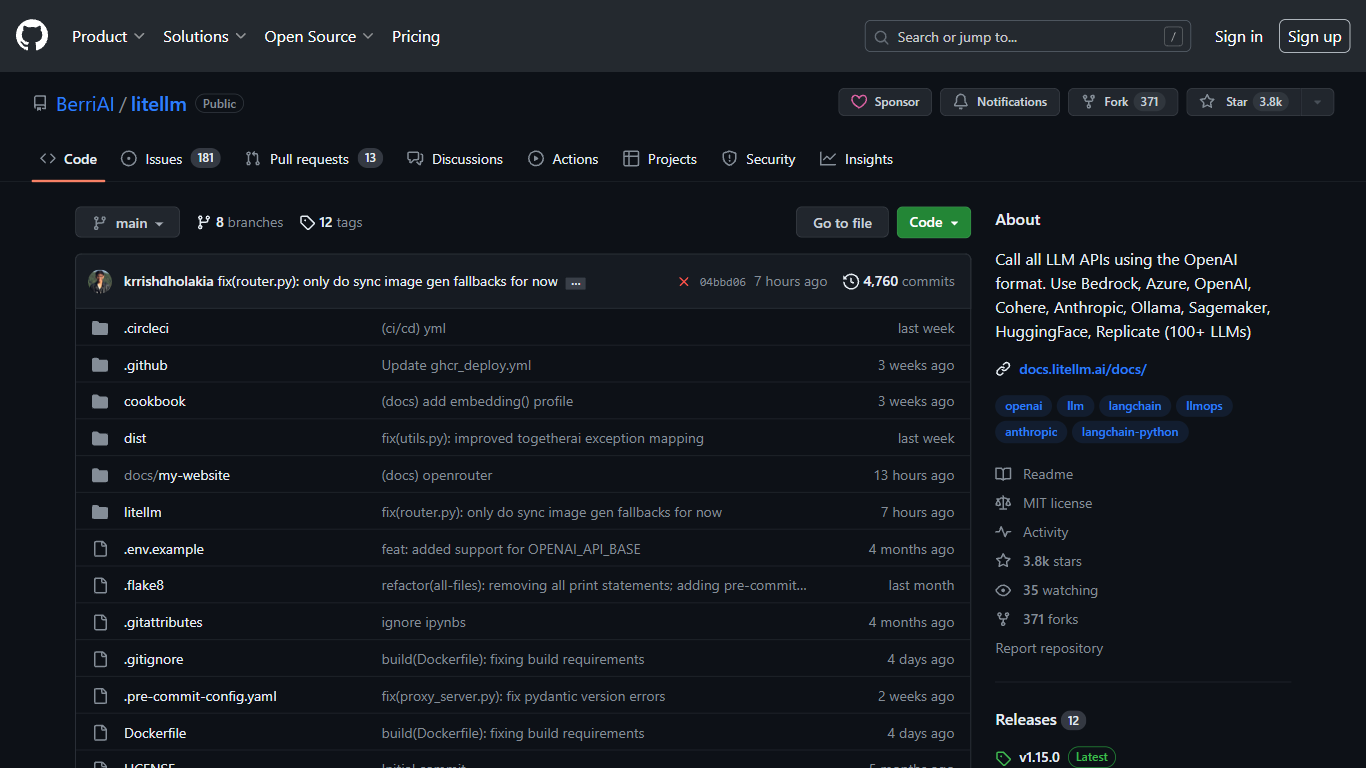BerriAI/litellm - GitHub vs ggml.ai
Explore the showdown between BerriAI/litellm - GitHub vs ggml.ai and find out which AI Large Language Model (LLM) tool wins. We analyze upvotes, features, reviews, pricing, alternatives, and more.
In a face-off between BerriAI/litellm - GitHub and ggml.ai, which one takes the crown?
When we contrast BerriAI/litellm - GitHub with ggml.ai, both of which are exceptional AI-operated large language model (llm) tools, and place them side by side, we can spot several crucial similarities and divergences. The upvote count is neck and neck for both BerriAI/litellm - GitHub and ggml.ai. Every vote counts! Cast yours and contribute to the decision of the winner.
Disagree with the result? Upvote your favorite tool and help it win!
BerriAI/litellm - GitHub

What is BerriAI/litellm - GitHub?
LiteLLM offers a universal solution for integrating various large language model (LLM) APIs into your applications by using a consistent OpenAI format. This tool allows seamless access to multiple providers such as Bedrock, Azure, OpenAI, Cohere, Anthropic, Ollama, Sagemaker, HuggingFace, and Replicate, among others, without the need for adapting to each provider's specific API style. LiteLLM's features include input translation to different providers’ endpoints, consistent output formats, common exception mapping, and load balancing for high-volume requests. It supports over 100 LLM APIs, making it an indispensable tool for developers looking to leverage AI language models across different cloud platforms, all with the ease of OpenAI-style API calls.
ggml.ai

What is ggml.ai?
ggml.ai is at the forefront of AI technology, bringing powerful machine learning capabilities directly to the edge with its innovative tensor library. Built for large model support and high performance on common hardware platforms, ggml.ai enables developers to implement advanced AI algorithms without the need for specialized equipment. The platform, written in the efficient C programming language, offers 16-bit float and integer quantization support, along with automatic differentiation and various built-in optimization algorithms like ADAM and L-BFGS. It boasts optimized performance for Apple Silicon and leverages AVX/AVX2 intrinsics on x86 architectures. Web-based applications can also exploit its capabilities via WebAssembly and WASM SIMD support. With its zero runtime memory allocations and absence of third-party dependencies, ggml.ai presents a minimal and efficient solution for on-device inference.
Projects like whisper.cpp and llama.cpp demonstrate the high-performance inference capabilities of ggml.ai, with whisper.cpp providing speech-to-text solutions and llama.cpp focusing on efficient inference of Meta's LLaMA large language model. Moreover, the company welcomes contributions to its codebase and supports an open-core development model through the MIT license. As ggml.ai continues to expand, it seeks talented full-time developers with a shared vision for on-device inference to join their team.
Designed to push the envelope of AI at the edge, ggml.ai is a testament to the spirit of play and innovation in the AI community.
BerriAI/litellm - GitHub Upvotes
ggml.ai Upvotes
BerriAI/litellm - GitHub Top Features
Consistent Output Format: Guarantees consistent text responses across different providers.
Exception Mapping: Common exceptions across providers mapped to OpenAI exception types.
Load Balancing: Capable of routing over 1k requests/second across multiple deployments.
Multiple Providers Support: Access to 100+ LLM providers using a single OpenAI format.
High Efficiency: Translates inputs efficiently to provider's endpoints for completions and embeddings.
ggml.ai Top Features
Written in C: Ensures high performance and compatibility across a range of platforms.
Optimization for Apple Silicon: Delivers efficient processing and lower latency on Apple devices.
Support for WebAssembly and WASM SIMD: Facilitates web applications to utilize machine learning capabilities.
No Third-Party Dependencies: Makes for an uncluttered codebase and convenient deployment.
Guided Language Output Support: Enhances human-computer interaction with more intuitive AI-generated responses.
BerriAI/litellm - GitHub Category
- Large Language Model (LLM)
ggml.ai Category
- Large Language Model (LLM)
BerriAI/litellm - GitHub Pricing Type
- Freemium
ggml.ai Pricing Type
- Freemium
